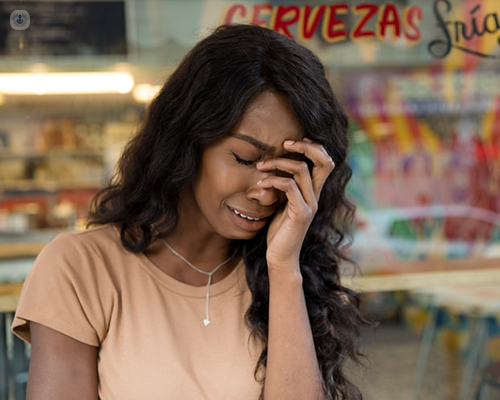Why do I feel sad for no reason?
Escrito por:We all have days where we feel down and sometimes feeling sad can happen for no apparent reason. Occasionally, sadness is natural but other times it isn’t and perhaps it is a symptom of depression. The good news is that there are plenty of useful tools available for people living with unexplained sadness. One of our psychologists Dr Jessica Valentine explains the possible reasons behind feeling sad and what you can do to make yourself feel better.

Is feeling sad and not knowing why common?
It is normal to feel low and not understand where it is coming from. Sometimes we have memories that have been deep routed from our childhood or a painful situation that you might have blocked out. People feel low for various reasons. I know that I feel low in the wintertime because there isn’t enough sun. I manage this through diet, exercise, meditation and travelling.
Feeling low after a loss, a breakup, or ‘for no reason at all’ is all normal. When you work with a psychologist like myself, we can piece all of the information together to find out what is ‘triggering’ you to feel this way. Often people feel low because they are not happy in their life or can feel like their life is mundane. We can help restore the balance in your life using a few simple techniques.
Could feeling a sudden low mood or sadness be a sign of depression?
A sudden low mood or sadness can be a sign of depression. There are various types of depression. Someone could be feeling melancholy, which is feeling low without knowing why or on the other side of the spectrum someone could have symptoms of severe depression which could have been a result of having trauma in one's life. I have had clients who had been feeling low because they had a vitamin deficiency.
Often, anxiety and can play a huge role in depression. We might feel anxious, shame or guilt ourselves and then we feel ‘bad’ about it. This is how depression plays a role in anxiety and when someone has mixed episodes with anxiety and depression. This is why it is so important to understand how mindfulness works. Mindfulness works by being aware of your own body, being aware of others around you and focusing on your body’s breathing and sensations.
How are depression and sadness different?
Depression and sadness are different. Sadness is a symptom of depression. Other symptoms of depression are anger, frustration, avoidance and the feeling of being stuck. Not everyone will have similar symptoms.
It is normal or ‘atypical’ to feel sad sometimes. Other feelings such as anger, happiness, frustrated, annoyed or agitated are all okay to feel. Sometimes when we have strong feelings or emotions it can affect our personal relationships, work, and home life. This is when we need to learn other ways to handle or deal with these emotions in a healthier, proactive kind of way.
The DSM-V Psychological Diagnostic manual recognises nine categories of depression. The areas of depression that someone might fall under would be major depression, persistent depressive disorder, bipolar disorder, seasonal affective disorder, psychotic depression, postpartum depression, premenstrual dysphoric disorder, situational depression and atypical depression. Each one of these categories has its own unique symptoms.
What are the main symptoms of depression?
Some symptoms of depression could include:
- Loss of interest or pleasure in your activities
- Weight loss or gain
- Trouble getting to sleep or feeling sleepy during the day
- Feelings restless and agitated, or else very sluggish and slowed down physically or mentally
- Being tired and without energy
- Feeling worthless or guilty
- Trouble concentrating or making decisions
- Thoughts of suicide
What do you recommend to those who feel sad or low frequently?
When you feel sad or low three tips to increase your vibrations are:
1. Move your body.
Exercising or going for a walk will make you feel happier.
2. Examine your diet.
By taking high doses of omega oils and vitamin B complex one can naturally boost their nervous system to give it more support on those days when you are feeling low.
3. Practice guided meditation
By meditating 10 minutes a day on a weekly intention this will give you the guidance and internal self-help that you might need.
Are there online services people can use from home?
There are so many great self-help resources online. Make sure that any advice you read online is from a well-known organisation such as the NHS or WebMD. You can also book online with me to discuss more of what is discussed.
There are many psychologists who work from their home offices and can help support you if you are travelling, at work or would like support from the comfort of your own home. You can simply request an online video call with me by accessing the e-Consultation button next to my photo on my profile.
If you would like to work with Dr Valentine, you can book the first appointment either to see her in the clinic or via an online video call, here.


